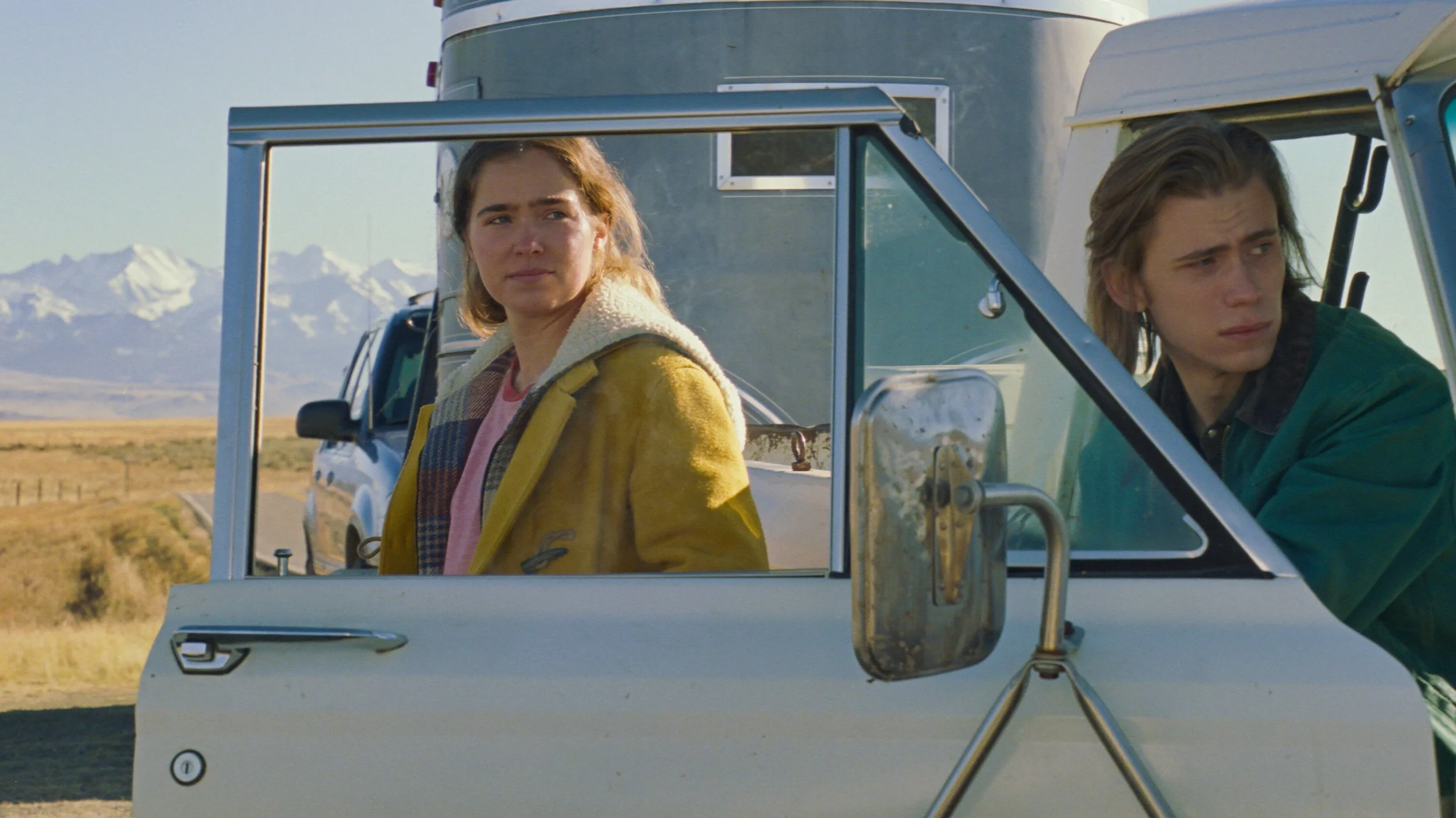Montana Story: A bitter homecoming in Big Sky country
By Liam Lacey
Rating: B-plus
“Just another crime scene out in the ol’ West,” says a young woman, as she stares down into a vast open pit mine, which yawns like a gaping wound in the earth in the new movie, Montana Story.
A drama about estranged siblings reunited for the death of an abusive parent, Montana Story is from writer/directors Scott McGehee and David Siegel (What Maisie Knew, The Deep End). It’s a neo-Western, a sensitively acted, heartfelt and ambitious drama which stumbles when it resembles an illustrated thesis about the legacy of the West.
Haley Lu Richardson and Owen Teague take on a horsey escape plan in Montana Story
Though we tend to think of Western movies as an obsolete genre, the form has given us the last two Oscar-winning films, Chloé Zhao’s Nomadland, a documentary-drama hybrid about a modern West peopled by modern individuals cut loose from basic social protections and in Jane Campion’s portrait of toxic masculine culture, The Power of the Dog.
The myth, born in the two decades of Western settlement after the Civil War, has left an ideology still embraced by modern Republicans: The celebration of American individualism, a distrust of the government that had recently given Black people the vote, a fetishization of gun culture and, as the historian Heather Cox Richardson recently wrote, “a conviction that true men dominate situations, both at home and abroad, with violence.”
On the positive side, there are those great landscape and horses.
The young woman staring into the Montana pit is named Erin (Haley Lu Richardson). She has recently returned from the east after seven years of estrangement from her younger brother, Cal (Owen Teague), who is beside her, staring into the same metaphoric pit. Cal has been away at engineering school.
They have returned to bury their father Wade (Rob Story), who is lying in a coma on life support in the family ranch house, tended by his Kenyan personal support worker, Ace (Gilbert Owuor) and an Indigenous housekeeper, Valentin (Kimberly Guerrero).
The siblings are not grieving for their father, whose many sins as a lawyer included a cover-up of toxic waste from the mine they’re looking at.
A violently abusive man who survived two wives, Wade drove Erin from the home and left Cal, then a scared 15-year-old, haunted by his failure to help her. To emphasize the Western legacy he represents, Wade also acted out his cowboy fantasies by buying a 200-acre ranch and then running it into bankruptcy, leaving Cal to sell the property to pay off medical bills.
When Cal first arrives at the family ranch, he doesn’t bother to look in on his dying father directly. Instead, he heads out to the stable to visit the family’s 25-year-old stallion named Mr. T.
The horse becomes the reason why Erin changes her initial plan to leave immediately after seeing her father. When Cal tells her he plans to have the animal euthanized because there is no one to care for it, Erin decides to transport the animal across the country to live with her in her new home in upstate New York. There, he’ll be far away from Montana’s oppressive Big Sky, which she describes as “so big that you step outside and you feel like you’re inside of something.”
First, Cal and Erin must take a road North to buy a horse trailer from an Indigenous man named Mukki (Eugene Brave Rock). Mukki thinks Erin’s plan to transport an old horse across the country is impractical, but acknowledges he’s done a lot of “stupid things” to help an animal.
On the way home, there’s a car breakdown, and a side trip to the toxic mine pit. The housekeepers’ son, Joey (Asivak Koostachin), an old friend of Erin and Cal who reminds them of happier days, comes by to help them get the car and trailer home.
The pace of Montana Story is deliberate and naturalistic, though the characters’ reserve and taciturn dialogue for the first two thirds of the film flares into something closer to melodrama in the last third. That happens over the course of a dark and stormy night, when Erin and Cal are forced to hash out their old grievances, as their father lies dying in the next room.
There is much to admire in Montana Story, especially the performance of Richardson, as the tightly knotted Erin, and Teague, as her emotional punching bag. Cinematographer Giles Nuttgens captures the traditional poetic imagery of mountains, running horses and cloud-strewn sky, while avoiding postcard cliches.
But it’s far from a seamless narrative, and it often feels awkwardly literary when the characters become mouthpieces for the writers’ agenda. Staring into the mine pit, Erin improbably evokes Dante’s circles of hell, the lowest circle which is reserved for “betrayers of special relationships .. community, kin.” Cal is burdened with a number of confessional exposition-crammed monologues, often with caregiver, Ace, as his sounding board, That raises another kind of awkwardness, a form of over-compensation, where the characters of colour, the three Indigenous characters and the African caregiver Ace, are one-dimensionally sensitive and empathetic. It’s an approach that employs them, not as fully developed individuals, but emotional support humans for the white siblings.
As the story moves toward a predicable family reconciliation, there’s little room left for ethical ambiguity. Though he never speaks, the father, Wade, becomes a tiresome presence, a one-dimensional villain who, we learn, even once killed a pet horse out of sheer spite. That makes him not not only a bad father but a particularly shameful cowboy.
Montana Story. Written and directed by Scott McGehee and David Siegel. Starring: Haley Lu Richardson, Owen Teague, Kimberly Guerrero, Gilbert Owuor, Asivak Koostachin and Eugene Brave Rock. Opening in theatres June 17.


